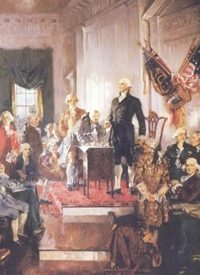
Thursday, August 16, 1787. The State House in Philadelphia was hot, hot, hot. The delegates gathered to “form a more perfect union” were sweltering. Despite the oppressive heat, the windows remained closed and the heavy drapes remained drawn so as to maintain the seal of security under which these critical (and somewhat rebellious) deliberations were taking place.
The night before, General George Washington, “the indispensable man,” from his room at Robert Morris’s townhouse on the corner of 6th and Market, penned a brief missive to his friend, the Marquis de Lafayette, explaining the purposes of the Convention:
The disturbances in Massachusetts have subsided; but there are seeds of discontent in every part of this Union, ready to produce other disorders if the wisdom of the present Convention should not be able to devise, and the good sense of the people be found ready to adopt, a more vigorous and energetic Government, than the one under which we now live; for the present, from experience, has been found too feeble and inadequate to give that security which our liberties and property render absolutely essential, and which the fulfillment of public faith loudly requires….
The goal was established from the first day of the Convention back in May: Give the United States a government strong enough to govern, but limited sufficiently in its powers so as not to devolve into a top-heavy tyranny as had so many of the republics of history.
As the Convention opened on the morning of August 16, the delegates were ready to move on from defining the precise sphere of the president’s power to veto legislation and on to the difficult duty of determining the powers to be vested in the Congress. Earlier in the Convention, the representatives of the attendant states, while conducting business as a “committee of the whole,” cast non-binding votes on several resolutions granting expansive powers to the legislative branch. Later, the Committee of Detail, chaired by John Rutledge, whittled those resolutions down to eighteen narrowly defined powers.
The first of these specific provisions was the thorniest and perhaps the most crucial if the proposed national government was to accomplish the end for which it was being designed: the power of Congress to levy and collect taxes. Most of the assembled delegates recognized that for a national government to achieve the aim of vigor and energy, it would need funds as a means to that end. As Governor Edmund Randolph of Virginia said, “It is a farce to give power to Government and to withhold the means of executing.”
It was just that sort of farce that rendered the national government under the Articles of Confederation impotent and unable to bind the states together. The Congress established by that charter had no power to compel states to pay their share of the debts incurred during the prosecution of the War for Independence. Instead, the Articles government depended on voluntary payments from the states and thus suffered from irregular contributions that were the source of constant conflict among the confederate members. This situation rendered the government inadequate to the preservation of the Union and that liberty they had so recently secured by the sacrifice of blood and treasure.
Even the delegates most jealous of protecting the sovereignty of their home states agreed that the new government needed the power, albeit very limited and well defined, to raise revenue by levying a tax on the states.
The revised article offered for debate by the Committee of Detail read as follows: “The Legislature of the United States shall have the power to lay and collect taxes, duties, imposts, and excises.” The provision was voted on by the convention and was passed without objection. The power of Congress to tax would likely have remained precisely as written were it not for the vexing issue of the “General Welfare Clause.”
Two days after having so readily agreed on the endowment of the national legislature with the power to tax, the Convention began debate on the assumption by the new government then under consideration of the pre-existing debts of the states, debt ostensibly incurred to defend themselves against the invading British forces. The issue was assigned to a Grand Committee composed of one delegate from each state. The purpose of this committee’s deliberations should be whether the state debts should be paid be the national government as they were “contracted in the common defense.”
Three days of contentious debate resulted in the following proposal of expanded legislative power:
The Legislature of the United States shall have power to fulfill the engagements which have been entered into by Congress, and to discharge as well the debts of the United States during the late war, for the common defence and general welfare.
This was the first time that the phrase “general welfare” was in connection with the powers to be invested in the new Congress. Constitutionalists rightly can point to that day and that suggested article as the genesis of one of the most stridently contested constitutional principle in the history of our Republic. That two-word phrase has been misused by an unshackled legislative branch and misapplied by a complicit judicial branch to justify the disregard of the Constitution’s enumerated powers and the establishment of a regulatory oligarchy whose existence is self-perpetuated by pandering to a manufactured dependent class.
As the motions, seconds, and subsequent votes were heard and recorded, the “general welfare clause” was recommended to the Convention exactly as worded by the Grand Committee. Whether in favor or against the article as proposed, not a single delegate would have believed that he was voting to deposit in the Congress the power to finance anything remotely affecting the “general welfare” of the citizens of the United States. Much less could these men have envisioned the enormous redistributive leviathan that has been built upon that feeblest of jurisdictional foundations.
Immediately following the endorsement of the Constitution and its recommendation to the several state ratifying conventions, the proper interpretation of that foul little phrase was hotly contested.
One side advocated an extraordinarily powerful national government. These “nationalists” insisted that the “general welfare clause” conferred upon Congress a “separate, independent, and substantial power.” This power, they contended, stood alone and was in no way connected to the power to levy and collect taxes or to make good on the pre-existing wartime debts of the states.
This position contradicts the notes and the notions of the Constitutional Convention. From the beginning, the association of the “general welfare” with the power to tax referred specifically and solely to the belief that any new national authority should be responsible for making good on the loans taken out by the states to finance the War for Independence. Nowhere in the record of the proceedings of the Convention in Philadelphia is there mention of the grant of such an unchecked congressional power. In fact, the only time the phrase “general welfare” appears is, as stated above, in connection with assuring states that their war obligations would be assumed by the new government.
The other side of the debate, exemplified by James Madison, contended that:
Money cannot be applied to the general welfare, otherwise than by an application of it to some particular measure conducive to the general welfare. Whenever, therefore, money has been raised by the general authority, and is to be applied to a particular measure, a question arises whether the particular measure be within the enumerated authorities vested in Congress. If it be, the money requisite for it may be applied to it: it it be not, no such application can be made.
And again in a letter to Edmund Pendleton in 1792:
If Congress can do whatever in their discretion can be done by money, and will promote the General Welfare, the Government is no longer a limited one, possessing enumerated powers, but an indefinite one, subject to particular exceptions.
Judge Joseph Story, in his Commentaries on the Constitution, echoed Madison’s estimation of the proper estimation of the delegates’ understanding of the “general welfare” clause. “The Constitution was, from its very origin, contemplated to be the frame of a national government, of special and enumerated powers, and not of general and unlimited powers.
This construction was affirmed by Thomas Jefferson in a letter to Albert Gallatin dated June 16, 1817:
Our tenet ever was…that Congress has not unlimited powers to provide for the general welfare, but were restrained to those specifically enumerated; and that, as it was never meant they should provide for that welfare buy by the exercise of the enumerated powers, so it could not have been meant they should raise money for purposes which the enumeration did not place under their action; consequently that the specification of powers is a limitation of the purpose for which they may raise money.
Unfortunately, regardless of the persuasive logic of the opinions of Messrs. Madison, Story, and Jefferson, congressmen of both parties have for decades followed the tyrannical tack of usurping unlimited powers. They assume the ability (and, some argue, obligation) of the national government to employ the taxing power to finance any chimerical program with even tenuous impact on the “general welfare.” Consecutive congresses have clothed themselves with a mantle of authority unquestionably antithetical to the Founders’ sense of good government.
The very fabric of credulity is stretched beyond all logical limits by an assertion that a group of men so famously cautious of an overly powerful central authority would sit idly and mutely by as words and phrases were introduced into the Constitution that rendered all their hard-won limits and restrictions placed on that power absolutely futile.



